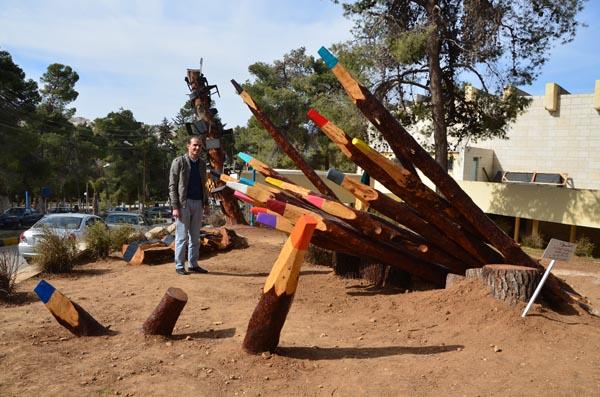AMMAN — Although more than 1,800 trees at the University of Jordan (UJ) were damaged in last December's snowstorm, the scene of destruction has now been transformed into an artistic wonderland.
Students and staff of UJ's faculty of fine arts created sculptural works using the trees that were damaged by the snowstorm.
"The university's administration and the students decided to launch an initiative to turn these trees into works of art," Fuad Khasawneh, assistant to the dean for student affairs at the faculty of fine arts, told The Jordan Times in an interview on Wednesday.
Dubbed "Cypress Memory", the initiative consists of three stages: Winter Memory, Spring Memory and Summer Memory.
"We chose this name because cypress trees are significant in this university. Previous students who have now become politicians and intellectuals once sat or studied under these trees," added Khasawneh, who also took part in the art initiative.
Participants began working on the first phase on January 5, and it took them 10 days to finish creating 30 art pieces.
"The university's administration gave us its full support to make this project successful," Khasawneh noted.
He noted that time was limited, as they wanted to complete their creations before Her Majesty Queen Rania visited the university.
The Queen joined UJ students and faculty members in their celebration of Arbour Day on January 15.
"We were really honoured that Her Majesty visited the site, and she even posted photos of our work on social media," he said.
According to Khasawneh, a number of professors have contributed to the initiative by turning broken trees into sculptures.
"My work is called Ihtiwa (containment) and consists of coloured pencils. The idea behind it is to illustrate that several intellectuals, artists, writers, thin people, fat people and people with disabilities used to sit under the very same trees."
One of the sculptures was vandalised by unidentified people, Khasawneh said, adding that the university and the participants are not accusing any party.
"Because of that, the administration decided to allow us to create five new sculptures to make up for the one that was vandalised".
In addition to these, another 30 works are planned within the second phase, which will start on February 1 and is expected to take around a month.
Spring Memory's art works will be presented at an outdoor gallery, according to Khasawneh, while artists from around the world will be invited to contribute to the third stage.
"We will invite international artists from Europe, the US and the Arab world to take part in Summer Memory, which will be ready by Independence Day, May 25," he added.
Khasawneh said preparing the first phase cost around JD10,000 and UJ supported the initiative by donating JD3,000.
"Students and their families also covered part of the expenses," he added.
Students interviewed by The Jordan Times said they enjoyed working on the project, adding that art was a medium to convey messages.
Raad Zaben, one of the participants, said the initiative highlights the cultural facet of the university.
"Some people believe that most students at UJ are aggressive because they keep hearing about incidents of campus violence. We wanted to change this outlook through art," the 21-year-old added, noting that his family supported his participation in the project.
Students and staff members who worked on the sculptures were busy from 7am to 10pm, Khasawneh said.
"Some families used to take pictures of their children while they were working".
Yasmin Kurdi, another participant, presented an installation created on a 4-metre-tall tree.
"My work, called 'Authority', consists of a number of black chairs on the tree, with a white one on top," the 23-year-old said, adding that it reflects several themes.
"One idea is that any person needs determination to reach the top. The second suggests that there is one person at the top and he does not pay attention to the damage around him; the only thing he cares about is himself".
Kurdi noted that some people in society do not interact well with art because they do not believe in it or understand it.
Abdullah Asadi, who created an installation with his friend, said their aim was to expose more people to art.
"We wanted to let as many people as possible know about this kind of art. The only thing we are seeking is to give the audience a visual experience."
## UJ, trees, art















